Keresés: %s
Keresés: %s
Hungary and many others pledge to support timely and decisive Security Council action against genocide, crimes against humanity and war crimes
During the official launch of the Code of Conduct regarding Security Council action against genocide, crimes against humanity or war crimes, over a hundred UN Member States supported timely and decisive action by the Council. They also pledged not to vote against resolutions that aim at preventing or ending such crimes. Hungary takes pride for participating actively in the elaboration of the Code.
The 70thanniversary of the United Nations offers an opportunity to reflect on the effectiveness of the Security Council. The Council’s frequent inability to take effective action to prevent or end genocide, crimes against humanity and war crimes – the worst crimes under international law – has been a stain on its reputation.
By 23 October, over a hundred Member States signed up to the Code of Conduct which was elaborated by the ACT group, including Hungary.
Ambassador Bogyay recalled that in 1956 - due to the paralyzed Security Council - the UN was unable to act and, as a result, failed to ensure Hungary’s freedom. She added that the Code – which to some extent also honors the victims of the 1956 revolution - represents a unique chance to preserve the Council’s legitimacy as the guardian of international peace and security.
The launch was webcasted by the UN, please find the full video on the right.
For media coverage of the initiative by the New York Times, please click here.
To read the full intervention by Ambassador Bogyay, please click here.
Hungary tables GA resolution on the Biological Weapons Convention
Hungary has successfully tabled the draft resolution on the Convention on Biological Weapons (BTWC) in the First Committee. The Committee will act on the resolution in the beginning of November, when adoption by consensus is foreseen.
The draft resolution on the Convention on the Prohibition of the Development, Production and Stockpiling of Bacteriological (Biological) and Toxin Weapons and Their Destruction (BTWC) was tabled by Hungary during the thematic debate of the First Committee on other weapons of mass destruction. As a result of inclusive and successful negotiations on the draft, the text, among others, further clarifies the nature of international cooperation and also paves the way for a transparent preparatory process for the 8th Review Conference to be held in late 2016.
Based on the negotiations on the text and also on the sentiments expressed during the thematic debate Hungary expects strong political support for the draft and its adoption by consensus.
Please find the statement delivered by H.E. Ambassador Zsolt Hetesy, Deputy Permanent Representative here.
Intervention by Ambassador Bogyay on Trafficking in Persons in Conflict Situations
Intervention by H.E. Ambassador Katalin Annamária Bogyay Permanent Representative of Hungary at the Security Council Open Debate on “Trafficking in Persons in Conflict Situations: Forced Labour, Slavery and Other Similar Practices”, 15 March 2017
Your Excellency, Mr. President,
Honorable members of the Security Council, dear Colleagues,
I wish to commend the UK for providing us the opportunity to reflect on this extremely important topic.
Let me also thank Secretary-General António Guterres, Mr. Kevin Hyland, Mr. Yuri Fedotov, as well as Ms. Ilwad Elman for their informative briefings.
Hungary, of course, aligns itself with the statement delivered on behalf of the European Union.
Mr. President,
Modern slavery is a crime of the 21st century: adaptive, cynical, sophisticated, extremely complex. It also means that this is a crime that can be fought only by applying modern, innovative, adaptable approaches that utilize the findings of new research and the latest technology.
We also have to recognize that given the diverse and complex nature of the problem, there is no single magical solution and no single organization that can tackle this problem alone. Our actions need to be tailored to the specific case at hand. Moreover, our response has to be gender- and age-sensitive, as well as exploitation type- specific.
In other words, the enslavement of Yazidi women and girls in Iraq, the recruitment of child soldiers in South Sudan, or the exploitation of migrants and refugees in Libya will all require the application of different tools and the involvement of different actors.
Mr. President,
Human trafficking, forced labour, slavery and similar practices became a recurring feature and by-product of armed conflicts. We find that in conflict and post- conflict situations, the level of insecurity, as well as the breakdown in family and community structures and other safety nets, raise the exposure of women and men, girls and boys, to diverse forms of exploitation.
It is particularly disturbing that Daesh, Boko Haram, Al-Nusra Front and other terrorist groups use sexual exploitation, forced marriage and similar practices as a tactic of terror and openly promote and engage in the enslavement and trade of women and girls, often targeting religious and ethnic minorities. In addition, transnational criminal networks take advantage of the instability found in so many parts of the world and generate enormous profits from preying on the most vulnerable and marginalized members of conflict-torn societies.
Mr. President,
I would like to emphasize the need of the UN to play a leadership role in the fight against all forms of modern slavery.
We commend Secretary-General Guterres for being here today and sharing his views on this issue. His presence means a lot to us.
As we have seen in recent months, Secretary-General Guterres adopted a number measures and came up with proposals that aim at improving the coherence of UN action and coordination among UN entities in areas such as counterterrorism or conflict prevention.
Today we are discussing a topic that is at least as complex as those that I just mentioned. Numerous UN entities, not only UNODC, but also ILO, OHCHR, IOM, UNHCR, UN Women, UNICEF are mandated to work on specific aspects of this challenge. Unfortunately duplication of efforts is frequent and we can even find competition that, let us admit, helps no one.
The complexity of the problem requires strengthened, better coordinated and coherent UN response, and it is also the very minimum the millions of victims deserve. Moreover, this is exactly what the leaders of 193 Member States called for when adopting the 2030 Sustainable Development Agenda and what the Security Council requested in its resolution 2331 (2016).
Taking all these into account, we encourage the Secretary General to place this issue high on his agenda, align it with the prevention-focused reform efforts, and play a proactive role in fostering better coordination and deepening cooperation in particular within, but also beyond the UN, just as he is currently doing in other areas.
Appointing a special envoy tasked to facilitate coordination, strengthening the Inter- Agency Coordination Group against Trafficking in Persons (ICAT), and/or convening a task force to guide how UN response should be further strengthened are some of the options.
Mr. President,
I wish to announce that later this year Hungary will host the regional consultations of the ILO-launched Alliance 8.7 initiative the very purpose of which is to strengthen cooperation and coordination among UN entities and other key stakeholders.
Hungary is looking forward to the 2017 review process of the Global Plan of Action to Combat Trafficking in Persons and we are ready to participate actively in future discussions on how to strengthen UN response to this global threat.
Mr. President,
We have to raise the awareness, make this crime more visible through media, art, working together with journalists and artists. It is high time to translate for everybody what it really means to be enslaved and how these chains of crimes are working.
Mr. President,
While we encourage the broadest possible ratification of the Palermo Protocol and the 2014 ILO Protocol on Forced Labour, we wish to emphasize that effective implementation of these international instruments is also essential. In this context, we recognize the usefulness of the technical and legislative assistance offered by UNODC and ILO to member states.
Compliance with international humanitarian law is also important, since it reduces the occurrence of situations that increase the vulnerability of civilian populations to terrorist groups and organized criminal networks, and by doing so, it indirectly contributes to the prevention of trafficking in persons in and from conflict-affected areas.
Ensuring accountability is also a must. States should step up their efforts in finding the perpetrators and bringing them to justice. Given the transboundary nature of these crimes, international judicial and law enforcement cooperation is fundamental. States should also train their immigration authorities, police forces, prosecutors and judges, and effectively carry out criminal procedures, with special regard to the sensitivities and the particular nature of these crimes.
Some of the acts we are discussing today may even amount to war crimes, crimes against humanity or be constituting elements of genocide. While the primary responsibility to bring the perpetrators of such acts to justice lies with States, subject to specific circumstances, the International Criminal Court may also play a role.
Here I would also like to highlight the potential of the mechanism currently being established to assist in the investigation and prosecution of those responsible for the most serious crimes committed in Syria, including such that fall under the theme of today’s open debate. Hungary has offered voluntary contribution for the Mechanism and we encourage others to do the same.
We should also explore what role existing mechanisms tasked to investigate allegations of breaches and violations of international humanitarian law (e.g. the International Humanitarian Fact-Finding Commission) could play in ensuring that those crimes that they become aware of, however, which do not violate international humanitarian law are to be investigated by the competent authorities.
I thank you for your attention.
Grandmaster and Planet 50-50 Champion Judit Polgár continues to inspire girls and women at CSW61
In an event organized by the Permanent Mission of Hungary to the UN and UN Women, Chess Grandmaster and Planet 50-50 Champion, Judit Polgár spoke about fighting gender stereotypes.
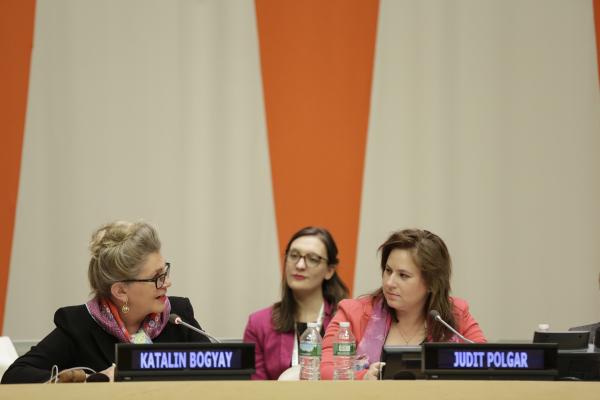
Following last year's successful side event on Fighting gender sterotypes and Judit Polgár's appointment earlier this year as Planet 50-50 Champion, the legendary grandmaster was invited to speak once again on her success to break glass ceilings.
Ms. Polgar is committed to working with UN Women to bring the message of gender equality and women’s empowerment to youth, her fans and followers. After her inspiring speech she played with representatives of New York youth chess clubs in a simultanous chess game.
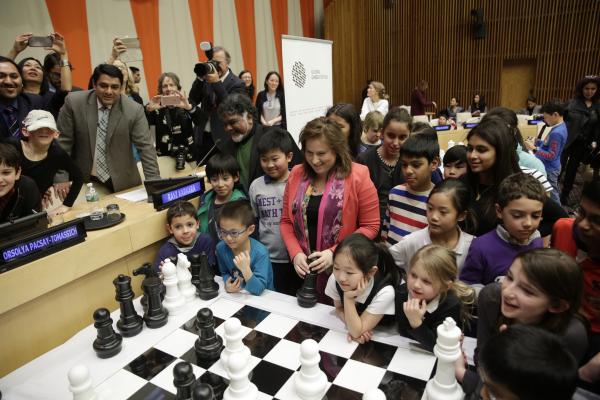
On the panel sat the representative of UN Women, Ravi Karkara; Ambassador Bogyay; Orsolya Pacsay-Tomassich, State Secretary for international and european affairs of the Ministry of Human Capacities and Hedva Ser, UNESCO goodwill ambassador.
See this great article An Evening at the UN with Judit Polgár about the event.
To see the photo diary of the event, please click here.
Hungary supports women’s economic empowerment
Hungary celebrated women’s empowerment with an active presence at the high-level week of the 61st session of the Commission on the Status of Women (CSW). In her national statement at the General Assembly, high level discussions and panels, Head of Delegation H.E. Ms Orsolya Pacsay-Tomassich, Deputy State Secretary for International and Youth Affairs presented Hungarian policies promoting women’s active participation and return to the world of work.
The Hungarian Mission organized an exhibition entitled “Painted Dreams – Hungarian Roma Women Artists”, and two side events, focusing on gender stereotypes and the importance of work-life balance.
The Hungarian Delegation participated at the opening ceremony of the high level week of CSW, addressed by President of the General Assembly H.E. Peter Thomson,; President of ECOSOC H.E. Frederick Musiiwa Makamure Shava,; Antonio Guterres Secretary-General; UN-Women’s Executive Director, Dr. Phumzile Mlambo-Ngcuka, among others.
Deputy State Secretary Ms Pacsay-Tomassich took the floor on Monday at the ministerial roundtable entitled ““Informal and non-standard work: what policies can effectively support women’s economic empowerment?”, presenting relevant Hungarian policies supporting families and women’s the participation and return into the world of work. The statement Is available here.
On Wednesday, at the high level interactive dialogue focusing on “Building alliances to promote women’s economic empowerment in the changing world of work”, Ms Pacsay-Tomassich underlined the importance of flexible and atypical forms of employment as well as new forms of day-care nursery systems making it easier for women to reconcile work and family life. You can reach the statement here.
In the national statement at the General Debate of the CSW, Hungary highlighted new policies aimed at fighting violence against women through victim support services, promoting the reconciliation of work and family obligations by strengthening the daycare and job protection system, and reducing the gender pay gap. Read the full statement.
The Hungarian Delegation, in collaboration with Kugler Art Salon and Gallery (Budapest), organized an exhibition entitled “Painted Dreams – Hungarian Roma Women Artists”, (photo diary here) celebrating the outstanding and inspiring work of women facing multiple and intersecting forms of discrimination. Besides H.E. Deputy State Secretary Pacsay-Tomassich, H.E. Ms Cristina Gallach, Under-Secretary General for Public Information and H.E. Ms. Ingibjorg Solrun Gisladottir, Regional Director for Europe and Central Asia, UN Women also addressed the audience on the occasion of the vernissage of the exhibit, which could be visited throughout the high level week at the Delegates Entrance of the UN General Assembly Building.
On Wednesday evening, in an interactive event organized by the Permanent Mission and UN Women, Chess Grandmaster and UNJ Women Planet 50-50 Champion Judit Polgár gave her insights about fighting gender stereotypes and the key to success for women in male-dominated fields.
The full-house panel discussion “Work-life Imbalance”, (photo diary here) hosted by the Hungarian Mission in collaboration with UN Women, aimed at combining policies and personal narratives on how women are able to achieve their full potential at the workplace and also at home. Panelists included H.E Ms Pacsay-Tomassich; Meg Jones, Chief of Women’s Economic Empowerment at UN Women, Judit Polgár Chess Grandmaster, UN Women Global Champion 50-50; Ms. Veronica Berti Bocelli, spouse of world renown tenor Andrea Bocelli and co-chair of the Andrea Bocelli Foundation, as well as Hedva Ser, UNESCO Goodwill Ambassador and Special Envoy for Cultural Diplomacy.
The Hungarian delegation also participated in a side-event organized by the NGO “Hungarian Women Union”.
Intervention by Ambassador Bogyay on Women in Water Diplomacy
Intervention by H.E. Ambassador Katalin Annamária Bogyay, Permanent Representative of Hungary to the UN at the Side event of the UN Commission on the Status of Women on “Women in water diplomacy as key to economic empowerment” on Friday, 17th March, 2017.
Your Excellences, Distinguished Speakers, Dear Ladies and Gentlemen, As a woman and a professional who worked extensively in decision making and multilateral diplomacy, a strong supporter of gender equality and a firm believer in women’s empowerment, I am honoured to speak at today’s event. The empowerment of women and girls is an essential contribution to economic life and sustainability at all stages of development, including relief, recovery, building peace and achieving inclusive growth. The 2016 UN World Water Development Report on Water and Jobs reveals that women in formal, high-level positions have a significant positive contribution to the economy. Both quantitative and qualitative analyses demonstrate that the involvement of women in water management can improve efficiency and productivity. Based on ILO’s statistics however the gap in labour market participation between men and women shows only moderate progress since 1995. Globally, about 50% of women were at work in 2014, compared to 77% of men. Twelve years ago, these figures were at 52% and 80% respectively. According to the International Water Association, the amount of paid jobs held by female workers in the water sector is very low comparatively: only around 17% of the paid jobs in the spheres of water and sanitation are held by women. Obstacles that women have to face are threefold: negative stereotypes, a considerable gender pay gap, and social expectations that negatively influence their career choices, including the need for balancing family and career, fitting into existing social structures, or simply struggling with lack of self-confidence. Gender equality is not only a matter of fairness. The untapped potential of brilliant girls and women is a great loss of economic opportunity, both for women themselves and for the society as a whole. Gender equality should therefore be considered as a crucial mean to promote economic participation. The most important difference of Agenda 2030 as compared to the MDGs and at the same time the largest challenge and opportunity lies in bringing together the implementation of water-related goals and targets with gender equality and the empowerment of women and girls. The SDGs set out investing in women especially in the areas of education, health and employability. The ability of women to achieve behavioural change and cultural shift is the greatest potential of all for sustainable social development and inclusive economic growth. Policy Recommendations of the Women’s Forum convened at the Budapest Water Summit in November 2016 underline that access to water is key for women’s empowerment, economic development and independence. It is in the fields dominated by males, such as leadership positions in politics, economics, science and technology decision making that we should aim at breaking through gender stereotypes. Let me share some examples of best practices from Hungary is this regard. The Hungarian National Strategy for the Promotion of Gender Equality for 2010-2021 sets out that the percentage of women in leadership positions should reach at least 40% in Hungary by 2021. The National Research-development and Innovation Strategy for the period 2013-2020, entitled “Investment in the Future” builds on the priority of creating equal opportunities for women in the Research, Development and Innovation sector. This will require multi-stakeholder partnership with civil society, private sector, academia, media and all relevant umbrella organizations that is well underway. Promoting gender equality should be embedded also in education and vocational training. The scholarship programme called Stipendium Hungaricum is Hungary’s most important bilateral development program promoting equal chances for education by providing access to our higher education institutes for students from developing partner countries. We are happy to see that every year there is a significant number of female applicants. Just to reinforce the practical stance here at the UN, on the day before yesterday, we hosted an event in the ECOSOC chamber with Planet 50-50 champion chess grand master Judit Polgár from Hungary on fighting stereotypes. Yesterday we had a side event on work-life (im)balance to demonstrate that women do not necessarily have to choose between family and career, as both are possible! As Ambassador and Permanent Representative to the UN, I believe in preventive diplomacy, where even smaller countries can have an important contribution to peace and security by building bridges in areas like science, water resources management and promoting gender equality. As co-moderator of the working level dialogue of 22 March under the auspices of the President of the General Assembly on ‘Improving the integration and coordination of the work of the United Nations on the water related goals and targets under its sustainable development pillar, with particular emphasis on the 2030 Agenda for Sustainable Development’, I paid special attention to the gender balance in the selection of speakers. I and my capital are pleased to see that Ms. Lesha Witmert, Steering Committee member of the Women for Water Partnership and UN representative for the International Federation of Business and Professional Women will give her introductory remarks in the first panel We’ll also have Ms. Sanjaasuren Oyuun, Chair of the Global Water Partnership in the second panel – both of them adding perspectives of women in important positions regarding the shaping of future water policies. I am sure we all agree that women in leadership positions should promote the inclusion of women at all levels of decision-making in order to empower them. The ultimate goal is to enable women fulfilling their full potential through equal economic opportunities to increase their chance in conducting a balanced life. Women empowerment also starts with access to safe water and gender responsive sanitation so that they are in a position to act as experts, partners, agents and leaders of change. I hope that I inspired you today to stand together and act for women and girl’s future as well as their right and contribution to sustainable development. I thank you for your kind attention!
High-level side events on the Sustainable Development Goal on water
Participating in high-level events on the margins of the high level week of the 70th session of the UN General Assembly, Deputy Secretary of State for International Cooperation Ádám Zoltán Kovács highlighted the essential role of water management in achieving sustainable development and poverty eradication, calling for a multilevel, inclusive approach for water cooperation and a regular global monitoring and reporting mechanism.
At the high-level event organized by Tajikistan in collaboration with the other members of the Steering Committee of the Group of the Friends of Water - Finland, Hungary, Switzerland, and Thailand - and the United Nations Development Programme, Deputy Secretary of State for International Cooperation Ádám Zoltán Kovács underlined that for the realization of SDG 6 a multilevel, inclusive approach for water cooperation, and a robust intergovernmental process to regularly monitor, review and assess progress of the implementation of the water goal are needed. Therefore, he reiterated Hungary’s call for the establishment of an Intergovernmental Panel on Water and Sanitation as already proposed by the Budapest Water Summit in 2013.
Participating in a side event organized by the governments of the Kingdom of the Netherlands, the Republic of South Africa, Hungary and the People’s Republic of Bangladesh, Deputy Secretary of State Kovács highlighted that the significance of the water-SDG lies in its novel comprehensive approach, having included the issue of water management regarding the whole water-cycle and sustainable water usage taking into account every – urban, industrial and agricultural – type of needs. He emphasized that meeting the water challenge requires new, innovative policy approaches, both within the water sector and in concert with other social and economic sectors, especially, health, food and energy.
To read the two statements at these events, please click here and here.
Intervention by Ambassador Bogyay at the special event on the International Day of Happiness
Intervention by H.E. Ambassador Katalin Bogyay, Permanent Representative of Hungary, at the special event on the International Day of Happiness, 20th March 2017.
Your Excellences, Distinguished Speakers, Dear Ladies and Gentlemen,
A smile is often the sign of happiness and contentment. Given the wide-ranging cultural characteristics of UN Member States, smiling is the universal language that really connects and unites us all.
What we as individuals and members of different communities embody today comes from our thoughts and ideas of yesterday, just as much as our present feelings and thoughts build the person we are becoming by tomorrow. This is the power of creation of our mind that is accompanied by human nature’s constant pursuit of happiness.
I am honoured to speak at this special event for the International Day of Happiness, which came into life through recognition by the UN Member States that happiness should be given greater priority.
The General Assembly resolutions of 2011 and 2012 recognized happiness as a fundamental human goal and called for a more inclusive, equitable and balanced approach to economic growth that promotes the happiness and well-being of all peoples. Sustainable development and peace are based not only on inclusivity, growth and harmony with nature, but first and foremost on human wellbeing.
History shows that the UN was born out of reality as a response by humanity to the horror and threat of war as well as the quest for lasting peace.
Especially today, when our world is confronted with numerous heavy conflicts, mutual understanding, compassion and common thinking should give hope to non violent approaches and the ultimate objective of achieving peace.
Lasting peace however cannot be reached without development. The Agenda 2030 draws up the vision of a world free of poverty, hunger, disease and want, where all life can thrive. A world free of fear and violence. A place of universal literacy, equitable and universal access to quality education, health care and social protection, where physical, mental and social well-being are assured.
Hungary welcomes that ensuring healthy lives and promoting well-being for all at all ages has been anchored in Goal 3 of the new Agenda, with a special focus on mental health.
With the SDGs, all Member States of the UN committed themselves to the universal respect for human dignity and human rights, good governance, rule of law, justice, equality and non-discrimination. There is a long way to go to have this ambitious vision implemented, which will require partnership by all. We should combine this universal outset for happiness with our own individual aspirations. Let me share some personal remarks in this respect.
Of course happiness means different things to people from different cultures. But let’s remember that societies have tremendous indigenous knowledge and vast cultural resources to guide them to peaceful coexistence. Exchanging views and experience implies learning from each other, while adopting various elements of others’ cultures. Traditions, artistic expressions, sites of cultural heritage and daily habits, such as the demonstration of national or regional specificities in gastronomy are factors that unite mankind. Understanding the indigenous forces and processes that promote tolerance, mutual acceptance and cooperation is the first step towards learning how to focus on positive factors that bring us closer to each other. This is especially relevant in cases where conflict had broken cooperation and we find signs of division and hatred.
With the new Agenda we have a golden opportunity and high hopes to put our world on a sustainable path, building a people and planet centred future for prosperity and general well-being for the generations to come.
Ladies and Gentlemen, I am convinced that we cannot achieve sustainability in the long run, if we do not lift cultural know-how as the fourth pillar of development, besides economic prosperity, social progress and environmental protection. The underlying reason is that only dynamics where people are both drivers and recipients of development, where interests of future generations are safeguarded can be sustainable. That needs involvement and ownership of individuals, communities and all humanity.
Even if happiness is a complex concept, which is hard to define, and even harder to measure, it is important to better capture the importance of happiness and well-being in development through SDG indicators with a view to guiding public policies.
As the Permanent Representative of Hungary in the UN, I promote my country’s engagement in social and economic development, particularly through gender equality in education, employment, growth and trade, with a special focus on the role of women in water resources management and various other important areas of preventive diplomacy. Based on my experience from multilateral and cultural diplomacy, I have seen that women are outstanding bridge builders in all areas from prevention to cure. Bridges that contribute to the betterment of our world.
Happiness is gratitude for what we already have in life and appreciation of what comes on top, such as beauty, human values and features, love and friendship. It is a constant state of curiosity, posing challenges and calling for actions, it’s both a state of mind and an aim we can create by ourselves and not just wait for.
I invite you all to pursue your dreams, be and stay an optimist and act as activist, because only together we can achieve cultural shifts that bring hope for those who suffer from conflict and make peace lasting through development that is truly inclusive.
Ladies and Gentlemen, I thank you for your kind attention!
Hungary proposes global solution for a global problem
On 3 October 2015, H.E. Péter Szijjártó, Minister for Foreign Affairs and Trade, concluded his official visit by addressing the General Assembly.
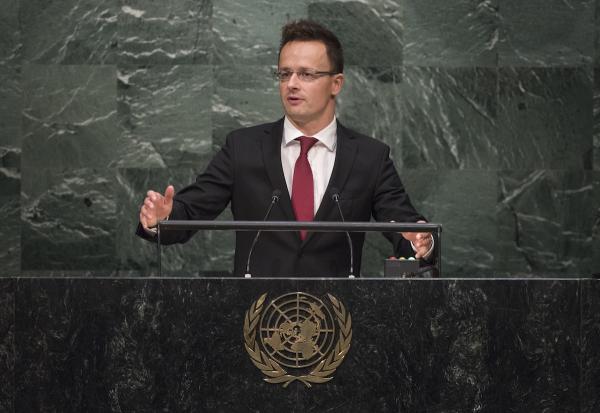
In his statement Minister Szijjártó commemorated the 70th anniversary of the foundation of the UN, however, he also reminded member states that there are no major reasons to rest on our laurels, for the world had not have to face so many difficulties at the same time than now, since the conclusion of the cold war.
Referring back to the statement made by Secretary-General Ban Ki-moon, he echoed in agreement that there had never been so many people on the move as just like now. As the root cause of this mass migration he pointed out that there had been a series of bad international political decisions (not only in Europe) and that the continuous territorial gain of ISIS resulted in the destabilization of a significant part of the Middle-East and North Africa Region.
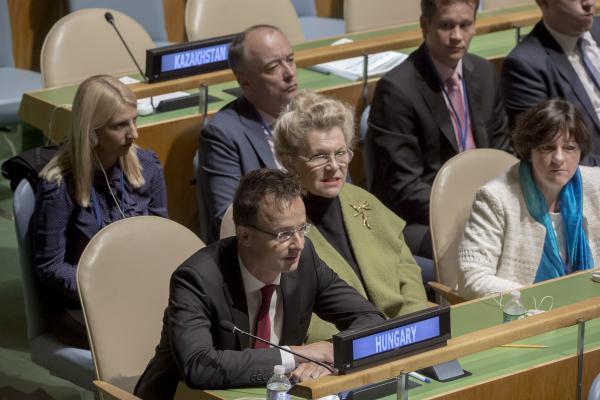
The Minister emphasized again that Hungary considers this a global challenge that needs a global answer, global solution based on global participation, and instead of addressing the consequences, the root causes should be handled. He introduced a five-points proposal: 1) we have to increase our international efforts against ISIS; 2) we have to stabilize the situation in North Africa and Middle-East region; 3) we have to create a system of world quotas of relocation of migrants; 4) we have to continue and strengthen UN Peacekeeping Missions; and 5) we have to fully implement Sustainable Development Goals.
On the same day, the Hungarian Minister of Foreign Affairs and Trade also met with Eritrea's current Minister of Foreign Affairs is Osman Saleh; and with Danish Foreign Minister Mogens Lykketoft, President of the 70th session of the UN General Assembly.
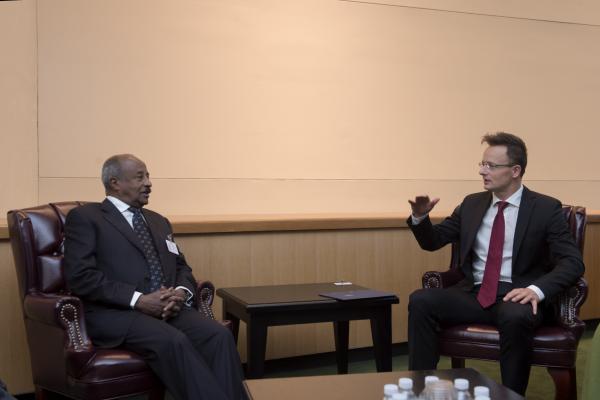
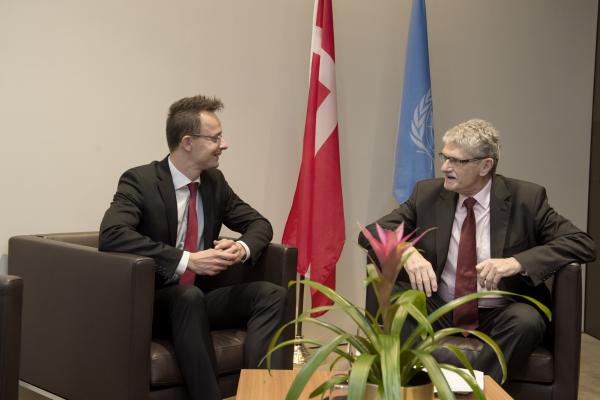
United Nations Alliance Of Civilizations Group Of Friends Ministerial Meeting
The United Nations Alliance Of Civilizations Group Of Friends Ministerial Meeting took place On 1 October 2015, on the margins of the high level week of the 70th session of the UN General Assembly. This year’s meeting concentrated on the topic of the relationship between the sustainable development goal and the work of the Alliance.
In his remarks H.E. Mr. Nassir Abdulaziz al-Nasser United Nations high representative called upon the participants to remember the 10th anniversary of the United Nations Alliance of Civilzations, take stock of our achievements and outline the path that the Alliance should follow to promote a peaceful, just and inclusive society. He also reminded that despite the similarities within the polarization of cultures then and now, the 4 pillars that identify the work of the Alliance are as relevant today as they were 10 years ago.
In his statement, H.E. Mr. István Mikola, Minister of State for Security Policy and International Cooperation emphasized Hungary’s belief that both cultural diversity and intercultural dialogue have an important role in promoting tolerance, thereby developing a peaceful and inclusive society. Hungary – also as the chair of the International Holocaust Remembrance Alliance, IHRA – is actively contributing to the promotion of tolerance. The issues addressed by the Alliance are as relevant today as they were at the time of its foundation, in 2005. It is crucial to pay appropriate attention to the priority areas set out previously, including the global challenge of migration.
Please find the full statement of the Minister of State here.
Prime Minister Orbán proposes global solution for a global challenge at the migration summit
On 30 September 2015, H.E. Prime Minister Viktor Orbán held an intervention at the high-level meeting at UN Headquarters on migration and refugee movements, convened by Secretary-General Ban Ki-moon.
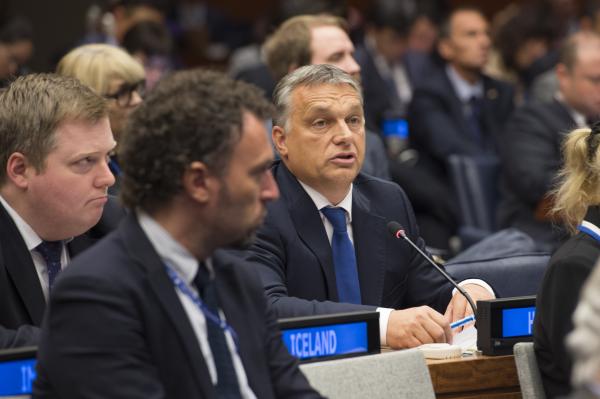
In his speech, Prime Minister Orbán urged the Secretary-General to initiate negotiations on sharing this burden on a global level. Hungary is of the view that all major stakeholders of international politics will have to take some of the migrants to their countries as part of the global quota system.
He emphasized that Hungary has compassion for the people who are victims of the poor governance of their countries, which took away their human dignity, and of failed international political decisions, which left to war torn regions. He called it a moral responsibility to give back these people their homes and their country.
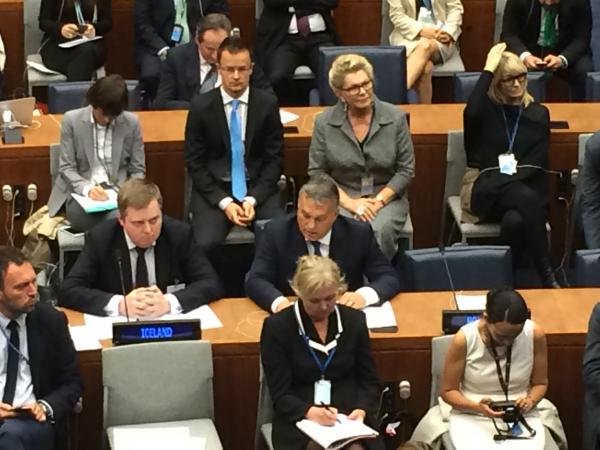
Please find the Prime Minister's speech here.
Prime Minister Viktor Orbán met with Rabbi Schneier at the residence of Ambassador Bogyay
On 30 September 2015, prior to his intervention at the Migration Summit, Prime Minister Viktor Orbán met with Rabbi Arthur Schneier at H.E. Ambassador Katalin Bogyay's residence in New York. The Prime Minister expressed his gratitude to the spokesperson of inter-faith dialogue, for the work he is and has been doing in the interest of Hungary.
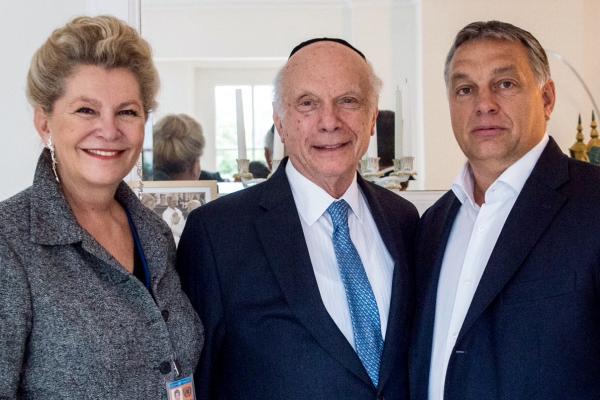
Minister Szijjártó gave a presentation at the joint event of the Permanent Mission of Hungary and the Foreign Policy Association
On 30 September 2015, Minister for Foreign Affairs and Trade, Péter Szijjártó gave a presentation at the event jointly organized by the Permanent Mission of Hungary to the UN and the American Foreign Policy Association. In his speech the Minister addressed contemporary issues such as the migration crisis, transatlantic relations and Ukraine.
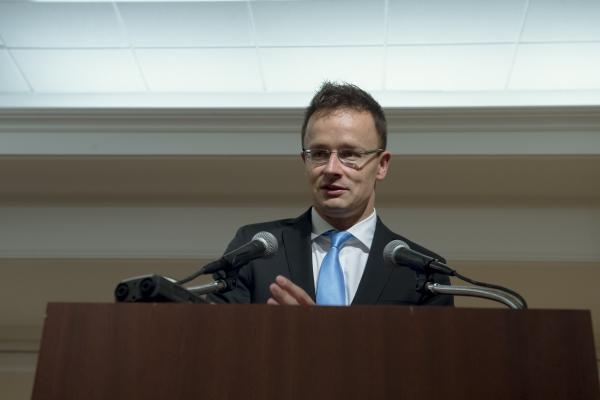
Foreign Minister Szijjártó addessing the audience.
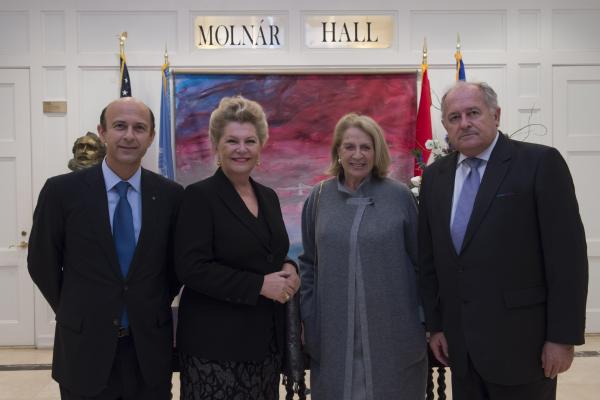
Noel V. Lateef President and CEO Foreign Policy Association; H.E. Ambassador Katalin Bogyay, Permanent Representative of Hungary to the UN; Daisy Soros and Dr. Tamás Lőrinczy
Introductory remarks by co-moderator Ambassador Bogyay at Dialogue on the water-related goals and targets
Introductory remarks by co-moderator H.E. Ambassador Katalin Annamária Bogyay, Permanent Representative of Hungary to the UN at the Dialogue on improving the integration and coordination of the work of the United Nations on the water-related goals and targets under its sustainable development pillar, with particular emphasis on the 2030 Agenda for Sustainable Development on 22nd March, 2017.
Happy World Water Day to Everyone!
Mr. President, Your Excellences, Dear Guests,
According to Leonardo da Vinci: Water is the driving force in nature.
Hungarian Nobel-prize winner of 1937, Professor Albert Szent-Györgyi, who discovered Vitamin C said that: “Water is life's matter and matrix, mother and medium. There is no life without water”.
Water is free. Water is restless. Water is not afraid. Water has been a source of inspiration to so many artists, composers, poets.
When it comes to water, cooperation is not an option, it is an imperative for safeguarding a vital life resource and a precondition for peaceful coexistence.
Water is not only the most critical natural asset, but also an enabler and an inter-connector. As we often say: WATER CONNECTS! Water diplomacy is a very important part of preventive diplomacy.
When I enter every morning this noble house, I always celebrate, that we are all coming from different cultures. Culture represents a perpetual motion- like a river you have all seen from a very long distance- from a top of a mountain or through an airplane window, as it carves out a distinctive shape in the land below.
From a distance it looks like a static, not a dynamic structure. But once you step in it, you feel the dynamic flow of water as it rushes around your legs with force and power. Changing, is the essence of water itself to get around the obstacles in its way.
Just like a river, culture is dynamic, adaptive and changing while at the same time forming a structure that defines who we are - our common values and shared identities at any moment in time and space.
So I would like us to be able to define with our diverse background our common goals and shared tasks, how to improve integration and coordination related to water. The implementation of the Agenda 2030 and its Sustainable Development Goals/SDGs will largely depend on achieving the water related goals and targets under the sustainability pillar. Water resources management and sanitation are linked to all areas of sustainable development, and therefore will be crucial for the years and decades to come.
Mr. Presdient,
I am honoured that Hungary has been appointed together with Tajikistan to co-moderate this dialogue. My country has been traditionally a frontrunner in water diplomacy. Global challenges in sustainable water resources management and the knowledge our experts gained throughout the years had led the Government of Hungary to organize the Budapest Water Summit first in 2013, in the International Year of Water Cooperation, and a second in 2016, under the patronage of H.E. Mr János Áder, the President of Hungary. With the participation of 117 government representatives, international and professional organisations, civil society, academia and the private sector, the event proved to be a landmark in water diplomacy.
Next to the plenary meeting, respective forums of women, very close to my heart, youth, civil society, as well as science and technology took place. The outcome document of the summit stresses that increased water-related vulnerability and insecurity of populations worldwide demand an urgent response. It clearly points out that acting now is a matter of human dignity, justice and survival. Hungary has been active in the group of Friends of Water as of the run-up to the Rio+20 conference.
Mr. President,
In order to give concrete and pragmatic solutions to challenges related to water, preliminary to the dialogue of today we had a discussion with the group in the big snow of New York, followed by expert level briefing on ongoing activities and initiatives of the UN system last week. I see today’s dialogue as a window of opportunity to address the implementation of water related SDGs and targets.
For over 40 years the United Nations has been actively engaged in strengthening and promoting the water agenda. Still, today’s dialogue is unique in the sense that neither the UN General Assembly nor ECOSOC are covering the water-related goals and targets of the 2030 Agenda in a regular fashion.
Our mandate as co-moderators comes from the resolution on the Water Decade. My aim as co-moderator is breaking the sectorial approach, look at today’s discussion with an open mind and an open soul. I count on your valuable inputs to see what we have today, works well, and to identify room for improvement.
I would like to encourage contributions also from academia, civil society and private sector. Even alarming signals are useful, so that we can start thinking of how to turn challenges into opportunities, by assessing their feasibility.
The outcome of today’s dialogue should be a summary to be prepared by the Co-moderators. I look forward to working with you all throughout this process.
Intervention by Hungary at the High-Level SDG Action Event
Intervention by Hungary at the High-Level SDG Action Event entitled "Climate Change and the Sustainable Development Agenda", 23 March 2017.
Your Excellences,
Dear Mr President, Dear Madame Executive Secretary,
Dear Ladies and Gentlemen,
The 2030 Agenda for Sustainable Development and the Paris Agreement are intertwined and mutually reinforcing. One cannot succeed without the other. Today’s High-Level Action Event is a great opportunity to use the momentum we have after the remarkable progress of the past one and a half year.
Hungary supported the early entry into force of the Paris Agreement by ratifying it as one of the first countries, in order to send a strong signal regarding our Governments’ commitment to address climate change. We were actually the first EU country to do so. It is a truly global and legally-binding agreement with the aim to strengthen the global response to the threat of climate change. We largely welcome that after ratification by 137 parties, the legal force is effective as of 4 November 2016.
Now it’s time for implementation of both the Agreement and the SDGs to overcome the unprecedented challenges of sustainability and poverty reduction. Our Ministry of National Development holding the climate and energy portfolio started to incorporate the provisions of the Paris Agreement into our climate strategy planning shortly after the ratification.
The assessment by the World Meteorological Organisation of the climate in 2016 published just the day before yesterday reports unprecedented heat across the globe, exceptionally low ice at the Northern and Southern poles and surging sea-level rise. This is very worrying indeed.
Having a Bureau Member in the Intergovernmental Panel on Climate Change; we encourage the Panel to provide concrete options and scenarios for effective decision-making taking into account the time constraint and the many advantages of early responses to the adverse effect of climate change.
We are convinced that countries need to establish inter-ministerial coordination and a sense of ownership of the agreements by all ministries domestically, i.e. to have a shared responsibility for their implementation.
It’s not only in the political sphere however, that high level messages need to be placed. Businesses should be closely involved in setting the path for sustainable development towards a more resilient future against the risks of climate change.
Achieving transformation to a low greenhouse gas emission and climate resilient global economy requires action by all stakeholders of social and economic life.
Hungary supports innovative partnerships on climate adaptation, mitigation and sustainable development solutions. Financing is critically important for the achievement of the SDGs, including on climate action. H.E. Mr. János Áder, President of Hungary has initiated a dialogue with multilateral development banks and other stakeholders to renew cooperation aimed at significantly increasing investment in the water sector.
The obligation of countries to produce their nationally determined contributions (NDCs) to the Paris Agreement gives a great opportunity to align their 2030 development needs with sustainable and low-carbon development.
We can seek solutions on keeping global average temperature rise below 2°C only through synergies, making finance flows consistent with a pathway towards low greenhouse gas emissions and climate resilient development.
Ladies and Gentlemen, I thank you for your kind attention!
High level Action Event on Climate Change and the Sustainable Development Agenda
The President of the UN General Assembly, Mr Peter Thomson convened a high level Action Event on Climate Change and the Agenda 2030 on Sustainable Development in collaboration with Ms. Patricia Espinosa, Executive Secretary of the United Nations Framework Convention on Climate Change (UNFCCC) in the Trusteeship Council Chamber on 23 March.
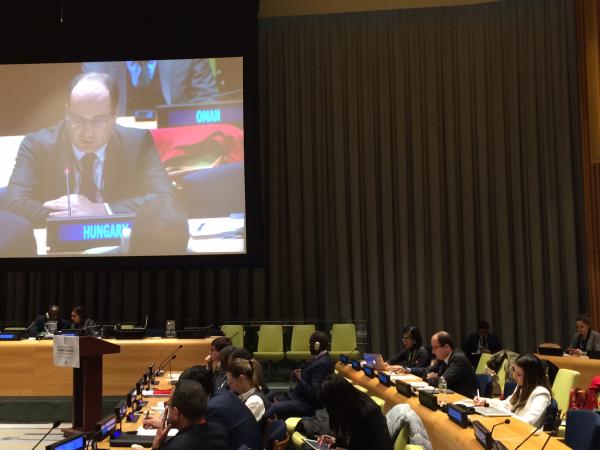
The SDG Action Event consisted of a high level opening segment with the President of the UN General Assembly, the UN Secretary General and the Executive Secretary of the UNFCCC.
The first panel took stock of ongoing efforts and assessed the level of ambition needed to address climate change, including progress on ratification and implementation of the Paris Agreement, as well as climate actions by all stakeholders with Ms Ségolène Royal, Minister of Environment, Energy and Marine Affairs of France and chair of the COP22 climate conference, the Chargé d’Affaires of Fiji as incoming chair of COP23, the Executive Secretary of the Green Climate Fund Secretariat, and the Governor of Washington State. The Chair of the Intergovernmental Panel on Climate Change gave a presentation about the alarming latest findings of climate science.
Participants welcomed the early entry into force of the Paris Agreement and stressed the mutual linkages of fighting climate change and achieving sustainable social and economic development. In parallel to the interventions at the plenary, two sessions dealt with the scaling up of Sustainable Development Goals in support of the climate objectives and achieving the 2020 targets along with the nationally determined contributions (NDCs) to the Paris Agreement.
Deputy Permanent Representative of Hungary to the United Nations, Mr Zoltán Varga emphasized that Hungary supported the early entry into force of the Paris Agreement by ratifying it as one of the first countries, in order to send a strong signal regarding the Governments’ commitment to address climate change. Now it’s time for implementation of both the Agreement and the SDGs to overcome the unprecedented challenges of sustainability and poverty reduction. Hungary’s Ministry of National Development started to incorporate the provisions of the Paris Agreement into the country’s climate strategy planning shortly after the ratification. Hungary supports innovative partnerships on climate adaptation, mitigation and sustainable development solutions. H.E. Mr. János Áder, President of Hungary has initiated a dialogue with multilateral development banks and other stakeholders to renew cooperation aimed at significantly increasing investment in the water sector.
The Action Event called for turning the challenges posed by climate change into opportunities to work towards low carbon and resilient economies. All participants encouraged investment in sustainable energy provision and mobilizing financing from a wide range of sources, including through innovative partnerships with private sector engagement.
To read the full national statement, please click here.
There is no solution to immigration crisis without pragmatic cooperation with Russia
There is no solution to resolving the conflict which constitutes the most significant source of the migrant crisis without pragmatic cooperation with Russia and without consultation with every party to the crisis in Syria, and there is consequently no solution to the immigration crisis without this either, said Minister of Foreign Affairs and Trade, Péter Szijjártó at the open debate of the Security Council on 30 September 2015.
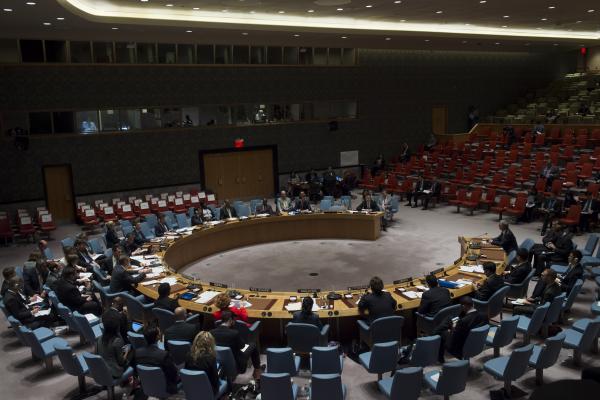
The Minister spoke about this before an open debate chaired by Russian Foreign Minister Sergey Lavrov began within the framework of the session of the UN General Assembly in the Security Council regarding the settlement of the conflicts in the Middle-East and North-Africa and counter-terrorism. Mr Szijjártó also spoke at the forum.
“It is time to dispel naïve illusions; without pragmatic cooperation with Russia, there is no solution to the immigration crisis as Syria is one of the most significant sources of the flood of migration”, the Minister stated.
He pointed out that due to the civil war in Syria, millions are fleeing from the region, and therefore, in the interest of resolving the immigration crisis, it is necessary to stabilize the situation in Syria above all; however, this cannot be achieved without Russia. In his words, the Trans-Atlantic community must wake up and realize that it is necessary to cooperate with Moscow in order to resolve the conflict.
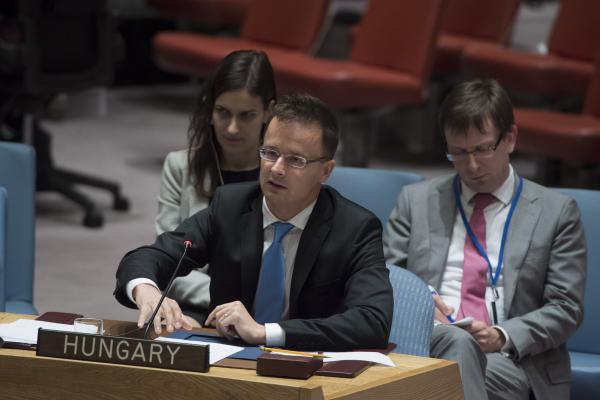
Mr Szijjártó stressed that all interested parties must be consulted in the interest of resolving the situation in Syria, and none of the parties to the conflict may be left out of this. “This is not yet about the sort of regime that there should be in Syria after the resolution of the conflict; we must take one step at a time as clearly the sweeping measures adopted to date have remained unsuccessful. We must therefore resolve the crisis in Syria step by step”, he said.
Mentioning the agreement on the restrictions on Iran’s nuclear program as an example, the Minister said that the international community can only rise to major global challenges if every important actor undertakes to make a contribution. He reiterated that at the time of the negotiations regarding Iran’s nuclear program, the German, British, French, US, Russian and Chinese foreign ministers all sat on the same side of the table. As he pointed out, this is what is required in the case of Syria as well.
“At the same time, we must also make clear that crimes, acts of genocide and crusades committed against Christians in Syria and in the Middle-East cannot go without consequences. We therefore continue to urge that the International Criminal Court institute procedures in the case of all acts of genocide, crimes and the persecution of Christians in the Middle-East”, he said.
“We cannot leave these crimes unpunished”, he added.
Interview with Prime Minister Viktor Orbán in the Wall Street Journal
In an interview with leading American daily The Wall Street Journal (WSJ) on Tuesday, 29 September Prime Minister Viktor Orbán warned that the migration crisis is threatening Europe’s stability.
The Prime Minister was of the opinion that unless Europe is able to react in a decisive manner, the mass influx of migrants from the Middle East and Afghanistan will threaten destabilisation of the EU.
According to the WSJ, Mr. Orbán said that “Without having an international solution in Syria, there’s no chance to stop the flood”. He said he thinks that it would be wrong for the developed world to see this challenge as one which only affects Europe.
The Hungarian prime minister defended the erection of the border barrier along the Hungarian-Serbian border, as well as a new measure under which those entering Hungary without the required travel documents can receive prison sentences of up to three years.
The article also reported that while last year 42,000 people arrived in Hungary, this year 280,000 migrants have already crossed the borders illegally.
According to Mr. Orbán, the United States and other countries – such as wealthy Arab states – should also receive migrants, as the current crisis could easily destabilise Europe.
“It’s not difficult to imagine that one or two years from now the old political elite will be replaced by the radicals”, the Prime Minister told the WSJ.

He stood by the argument that Hungary does not need migrants, the majority of whom at present would be Muslim. In his view, the task is not to create new opportunities for these people far from their home countries, but to help them in establishing their livelihoods there. “Morally, this is the right thing to do”, he said.
In his interview, the Prime Minister also explained that Hungary must preserve its independence, and the country must have the ability to decide whether it wants to welcome other cultures or not.
The WSJ quoted the Prime Minister as saying that “Muslim culture is very strong; we don’t oppose it but we haven’t had those parallel societies that are not integrated into European values”.
Minister Szijjártó holds a press conference at the UN
On 29 September 2015, Minister for Foreign Affairs and Trade, Péter Szijjártó held a press conference at the UN press briefing room. He explained several aspects of the migration crisis Europe is currently facing, to journalists accredited to the United Nations.
Minister Szijjártó furthermore gave interviews to the BBC, BBC Arabia, Sky News and gave an exclusive interview to Al Jazeera in the show: Talk to Al Jazeera.
Prime Minister Orbán at the high level week of the UN General Assembly
For the first time since assuming office, Prime Minister Viktor Orbán participated at the high level week of the General Assembly. The primary purpose of his visit is to voice a proposal of global burden-sharing at the migration summit, to which he was invited by Secretary-General Ban Ki-moon.
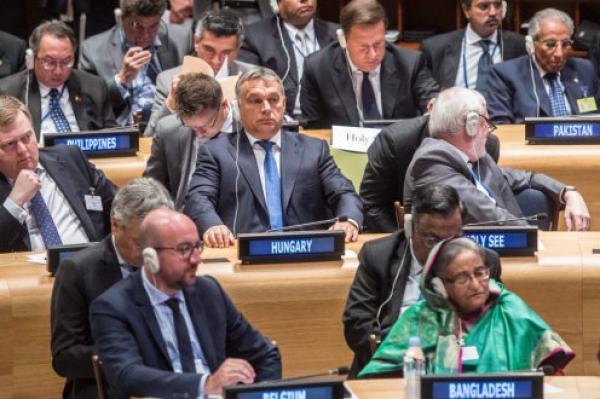
Today Mr. Orbán participated at the UN Leaders' Summit on Countering ISIL and Violent Extremism; chaired by United States President Barack Obama, highlighting the international community’s efforts to counter ISIL, address Foreign Terrorist Fighters, and Counter Violent Extremism.
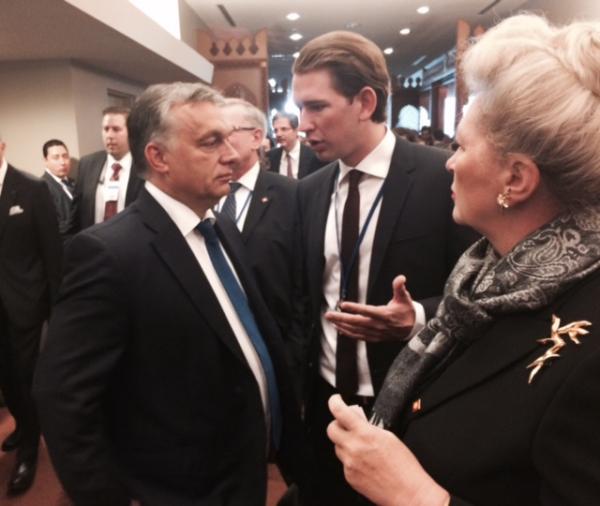
The migration crisis was the main topic of the bilateral meeting of Prime Minister Viktor Orbán and Abdel Fattah el-Sisi, President of Egypt. The parties concluded that the current migration crisis is a global problem, and therefore the response to the crisis must also be global.
In this context, Mr Orbán pointed out that the problem is not with Islam but with illegal mass migration.
To see the photo diary of the visit, please click here.
